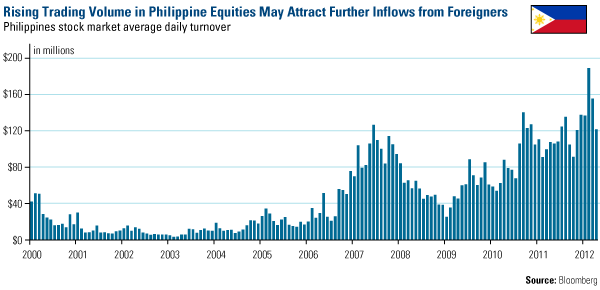Emerging Markets Radar (May 7, 2012)
Strengths
- China’s April PMI went up 20 basis points from the previous month to 53.3 percent, a fifth month-over-month increase. In spite of improved reading, the PMI is below market expectation for 53.6 percent, which caused investors to expect a bank reserve ratio cut to help economic growth. China HSBC April final flash PMI was 49.3 versus the previous 48.3, indicating small business activities are improving, but still in contracting mode. (PMI below 50 indicates manufacturing activities are contracting.)
- The Philippine’s Government Economic Planning Secretary opined that first quarter indicators are good, and growth could reach the upper range of their 5 to 5 percent target for 2012.
- China’s Securities Regulatory Commission cut trading transaction fees by 25 percent, which is beneficial to equity market liquidity.
- Korea’s Consumer Price Index (CPI) rose 2.5 percent in April, declining to a 21-month low.
- The Russian manufacturing sector registered a positive start to the second quarter. April PMI rose to 52.9 from 50.8 in March, signaling the best overall performance of the sector in twelve months.
- Turkish PMI also rose in April, registering 52.3, above the 50 no-change threshold for the first time since January. Output, new business and buying activity all returned to growth.
Weaknesses
- China’s April home prices fell to a 14-month low as the government pledged property curbs, according to SouFUN.
- The Philippine’s CPI rose 3 percent in April, rebounded from March’s 2.6 percent advance which was a 30-month low. April’s appreciation was still lower than 4.0 percent in January, due to higher utility, fuel and food costs. Indonesia’s CPI accelerated to a seven-month high in April, increasing 4.5 percent, in line with market expectation. Thailand’s CPI rose 2.47 percent in April, the lowest increase in more than two years due to state subsidies and easing food prices.
- Temasek raised $2.48 billion selling stakes in Bank of China and China Construction Bank, a selling trend by early foreign institutional investors that is possibly approaching an end.
- Korea’s exports fell 4.7 percent in April, declining for a second month and exceeding estimates of a 1.1 percent drop.
- Manufacturing data in Central Europe followed the eurozone’s into contraction territory in April. Polish PMI fell from 50.1 in March to 49.2 in April; Czech PMI fell from 52.1 in March to 48.7 in April, reflecting lower new orders, employment, and stocks of purchases.
Opportunities
- Turkey’s hopes for investment grade were dashed this week by S&P downgrading its outlook from positive to stable. Still, a tighter bias to central bank policy should help the lira strengthen from here, according to the HSBC foreign exchange strategy team.
- The chart below by Bloomberg shows increasing trading volume in the Philippine stock exchange, explaining why the Philippine market has outperformed Asian peer’s year-to date and the last year. Morgan Stanley research shows $829 million new money has flowed into the Philippine stock market so far this year, encouraged by better macro economic indicators and strong corporate growth prospects.

Threats
- Developers in China may need to raise money to improve liquidity and continue projects under construction due to tightening policy by the government.
- Policymakers in countries such as Brazil and India have been pursuing stimulative measures to boost their economic growth rates. However, their equity markets in general and bank stocks in particular have de-rated significantly as a result of such activism. Indonesia will likely be the next one affected, according to BCA research.













